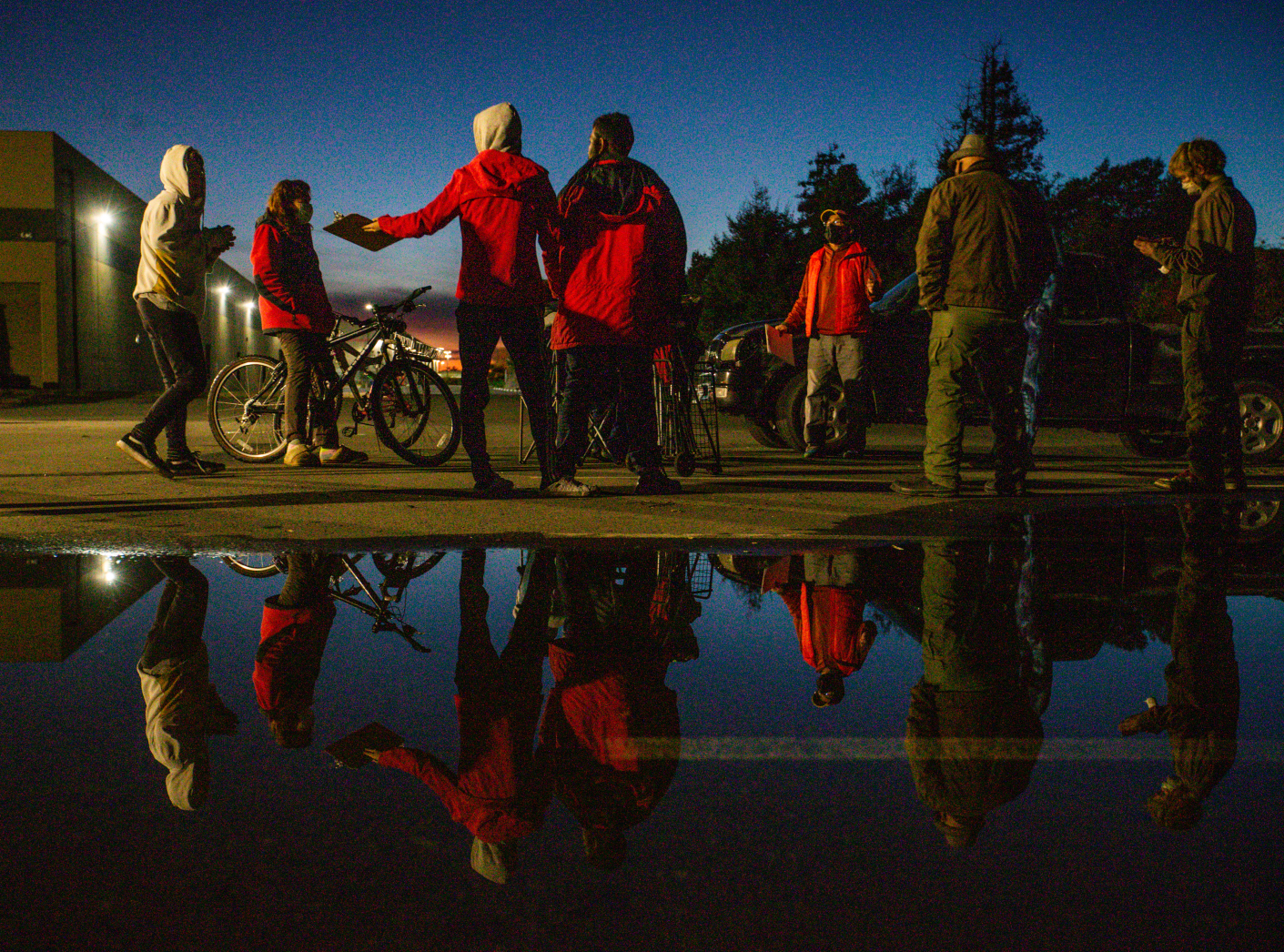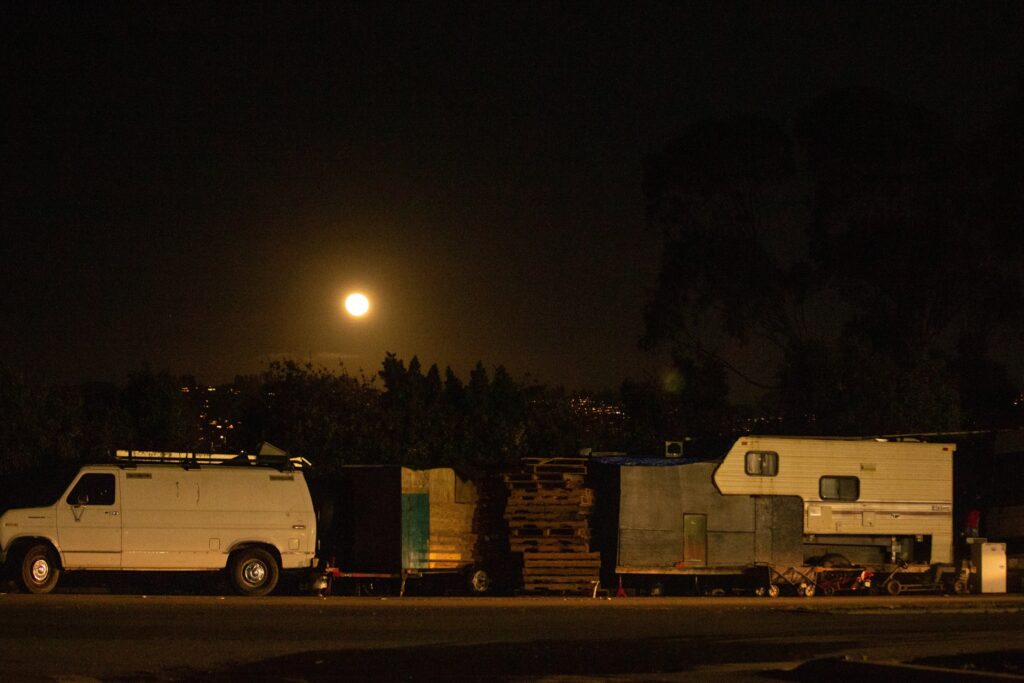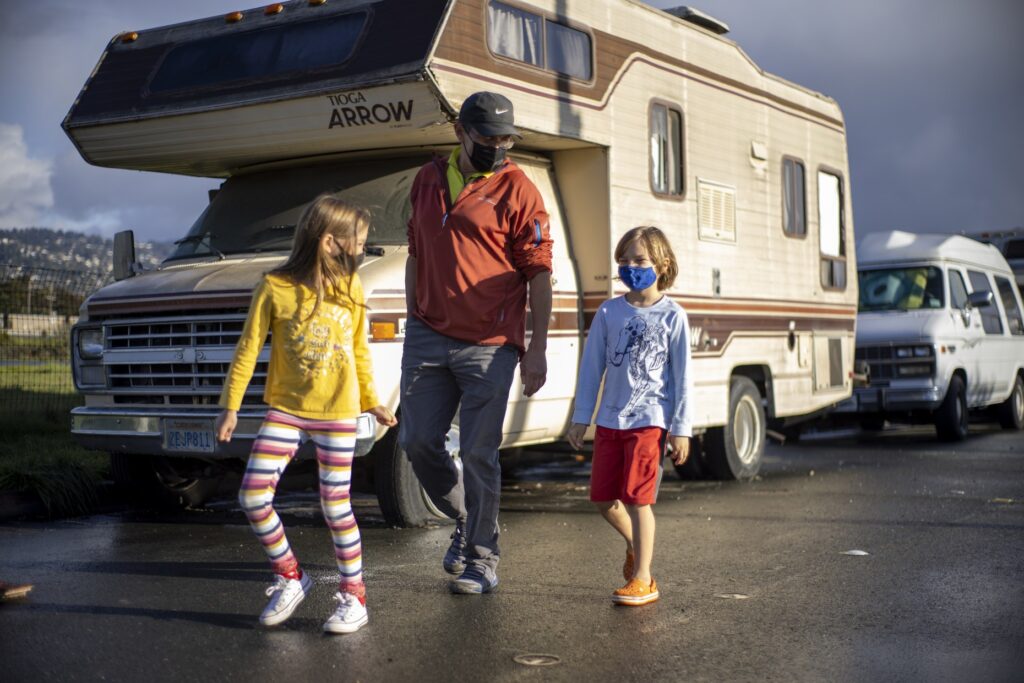‘We got rules down here.’ East Bay homeless camps are getting organized

Standing in a circle in an empty parking lot, the neighbors debated the most pressing issues in their community. They needed new security guards. The street lights were out. Certain people weren’t cleaning up their trash.
Unlike at a typical homeowner’s association or neighborhood watch meeting, they gathered outside in the cold because they had nowhere else to go. Nearly everyone there lives in RVs, trailers and cars parked along the side of Rydin Road.
The meeting was part of an experiment started by the tiny grassroots group Safe Organized Spaces Richmond, which tries to organize homeless communities and help them establish leadership structures, rules and codes of conduct. Unhoused members get paid small stipends in exchange for taking on tasks such as security, trash pickup and cleaning the encampment. The goal is to make the camps more habitable for residents and less of a burden on the surrounding community.
“What can we do from us, from community, to bring order here?” Daniel Barth, founder of Safe Organized Spaces, asked the group.
It’s an approach that’s likely to gain traction as Bay Area cities, grappling with major affordable housing and shelter bed shortages, realize their homeless encampments are here to stay — at least for now. Communities from San Francisco and Oakland to Mountain View and East Palo Alto are struggling to regulate unwieldy tent encampments and make-shift RV parks.

San Francisco hosts sanctioned encampments, where residents sleep in tents inside a fenced-off area with toilets, security and other services. Oakland is exploring “co-governed” encampments, where residents, working with a nonprofit, agree on community standards. The city recently opened applications to nonprofits, with the goal of setting up a camp by Feb. 20.
But so far, no one has applied.
San Jose has not pursued sanctioned or co-governed encampments, but like many other cities has stepped up its involvement in camps during the pandemic, providing portable toilets, hand-washing stations, trash pickup and other services.
The camp on Rydin Road, where people live in vehicles along the entrance to Point Isabel Regional Shoreline, isn’t technically sanctioned by the city. But city officials, who are avoiding disbanding encampments during the pandemic, are supportive of Safe Organized Spaces’ efforts.
“If we don’t have a place for people to go, we have to be able to supply some support and some services to people where they are,” said Michelle Milam, crime prevention manager for the Richmond Police Department and a member of the city’s homelessness task force. “Or else you’re going to have a public health hazard.”
Contra Costa County counted 280 people sleeping on the streets of Richmond as of January 2020, but homelessness has grown exponentially during the COVID-19 crisis, Milam said.
Since Safe Organized Spaces has gotten involved on Rydin Road, some residents and community members say conditions have improved.
“It’s calmed down a lot. It’s a lot different,” said 45-year-old Brandy Bolaños, who has lived in a van there for almost two years with her partner, Hector Navarro. “It feels good.”
Navarro has taken the lead on trash cleanup — he hauls garbage to the median strip in the middle of the road, where Safe Organized Spaces picks it up. He recently was appointed one of the camp’s four security guards, tasked with patrolling the area, checking on his neighbors and telling unwanted visitors or troublemakers to leave. The guards get weekly stipends between $65 and $90.
Barth, 57, started Safe Organized Spaces in 2018 after retiring from a 26-year career in homeless services to raise his two children. The group has five employees — all of whom are homeless except Barth — and has received $80,000 from the city of Richmond, and funding and support from HelloFresh and Chevron.
Part of Barth’s goal is to reduce tensions the Rydin Road camp has caused because of its proximity to commercial buildings and the shoreline operated by the East Bay Regional Park District.
“Members of the public and park staff are regularly besieged with human waste, lack of adequate sanitation, and garbage and hypodermic needles in the park and around its perimeter,” park district General Manager Robert Doyle wrote in an October letter imploring Richmond Mayor Tom Butt to relocate the camp immediately. “At least one recent needle stick to (a park district) employee occurred while cleaning District facilities.”
Tom and Jane Kelly, married park district volunteers in their 70s who clean the marshland around Rydin Road, said conditions have improved with Barth’s efforts. But they still worry about pollution in their beloved marsh.
Eventually, Barth hopes to move some vehicle dwellers onto the parking lots of willing churches. Others, he hopes to transition to an official, city-sanctioned safe parking site. The city council gave the green light this month to proceed with a site — the city’s first — either on part of the ailing Hilltop Mall’s parking lot or in front of City Hall.
In the meantime, Safe Organized Spaces is working on organizing three other encampments in Richmond.
It’s difficult work. Rydin Road is a motley community full of strong personalities, including some struggling with mental illness and addiction. An effort to conduct formal leadership training with residents quickly fizzled when people didn’t show up.
But some on Rydin Road take the work very seriously.
“We got rules down here,” said 46-year-old Angie Snowden, who lives in a bright blue trailer. “And you’re going to have to abide by them.”


